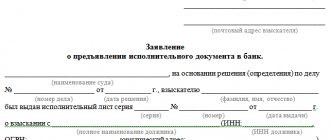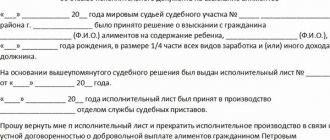What to do if enforcement proceedings are terminated
The termination of enforcement proceedings is formalized in the form of a resolution of the bailiff, in which he is obliged to indicate the grounds for such a procedural decision. Among the grounds for termination of enforcement proceedings are:
- death of the debtor or liquidation of a legal entity;
- execution of the court decision in full;
- impossibility of performance due to the debtor’s lack of property sufficient to repay the debt.
The impossibility of execution must be properly confirmed by the material of the enforcement proceedings (acts of impossibility of collection, materials of property search, etc.). However, even the proven fact of the impossibility of collection does not mean that the collector must come to terms with this fact and forget about the existence of the debt.
After receiving a decree to terminate enforcement proceedings, the claimant has the following options:
- file a complaint against the illegal actions of an FSSP official;
- re-send the writ of execution to the bailiff service for enforcement.
The consequences of the actions taken by the collector will make it possible to resume enforcement proceedings and achieve forced collection from the debtor.
About, .
Read about where and how to complain about bailiffs here.
Repeated presentation of the writ of execution for execution
Performance list
Dear readers! Our articles talk about typical ways to resolve legal issues, but each case is unique.
It's fast and free!
Enforcement proceedings provide for several options for the claimant's actions, one of which is the transfer of a document - a sheet (IL), a court order, to the bailiff service. In this case, the law on enforcement proceedings comes into force, which regulates the time frame within which collection actions must be carried out.
If they are unsuccessful, the sheet is returned to the bearer.
However, this does not deprive him of the right to re-submit a writ of execution for execution if information has appeared about a change in the financial situation of the debtor and the possibility of collecting the debt. How to resubmit the sheet and how many times you can submit it will be discussed in the article.
- How to resubmit IL?
- Deadline for resubmission
- Is it possible to restore the missed deadline?
- Application for re-initiation of IP
- Deadline for presenting ID
- How many times can IL be presented?
Related article: Collection of debts for housing and communal services through a court order
What is the deadline for receiving a writ of execution after a court decision?
In legal practice, the end of the process is initiated by objective reasons that should change the state of the case due to the execution of the decision and the fulfillment of all obligations of the parties specified in the writ of execution, and the termination is initiated upon the cancellation of the ruling in the case, appeal, newly arising insurmountable reasons, related and not related to decisions that make it impossible to implement. THE CONTENT OF THE ARTICLE:
- Reasons
- Resolution
- Appealing the decision to terminate enforcement proceedings
- Term
- Complaint
- Resumption of enforcement proceedings after its completion
- Conclusion
The end and termination of compulsory measures differ in the reasons and procedure for use.
If more than 3 years have passed between the dates the bank received the sheet in 2010 and the repeated presentation of the sheet to the bailiffs, then the repeated initiation of enforcement proceedings is illegal, by virtue of Art. 21 and 22 Federal Law “On Enforcement Proceedings”. That is, you have the right to challenge the decision to initiate enforcement proceedings (in court or through a senior bailiff), and to do this you have only 10 days from the moment you learned about the re-initiation of proceedings.
If you miss this deadline, the bailiffs will continue to collect the debt from you. You need to contact the bailiff department and submit an application to familiarize yourself with the materials of all enforcement proceedings on a court decision that are being executed in this department (indicate the number and date of the decision, as well as the name of the court that issued it). In accordance with Art.
If a complaint against a decision to terminate enforcement proceedings for objective reasons cannot be considered at the FSSP department where it was filed, then the employee responsible for this document is obliged to forward it within three days to the body that has the authority to carry out this consideration.
If the inaction of the FSSP causes damage to the plaintiff and threatens to disrupt the execution of the court decision, then it can also be appealed to a higher authority. Resumption of enforcement proceedings after its completion There are cases when enforcement proceedings require renewal after its formal completion.
Bailiffs Bailiffs work according to special administrative regulations. The procedure for conducting each case is determined by the job description and the relevant federal law. Any actions and decisions of bailiffs must take into account the statute of limitations.
Info
The specified limitation periods apply in particular to the entire procedure, and bailiffs will not have the right to take any action after their completion. Statute of limitations for enforcement proceedings by bailiffs Here it is customary to distinguish several statutes of limitations that relate to the conduct of individual actions. On general civil property grounds, the document received from the claimant must be executed within 2 months.
It is during this period that enforcement actions must be taken. The document itself can be presented by a person within 3 years.
The reasons for such a decision may be different:
- death of the debtor or closure (liquidation) of the organization;
- the court decision was executed in full;
- the debtor lacks property that could be used to repay debts.
The impossibility of further execution must be documented and based on the material of the enforcement proceedings. However, it must be understood that even the fact that collection is impossible does not mean that the applicant is obliged to accept the fact that the funds will not be returned to him.
- Submit a correctly completed complaint about the illegal actions of the bailiffs.
Upon completion of execution, a resolution is issued with copies sent to all possible participants in the process:
- the claimant and the defendant;
- to the judicial or executive bodies that initiated the proceedings;
- authorities that implemented restrictions on persons who violated the collection procedure, carried out a search or executed a court decision related to such restrictions and became invalid as a result of the end of the actions;
- credit institutions that complied with the requirements of the SSP or the defendant’s employer, who withheld funds from his salary.
The case can be stopped by the court that issued the documents, a higher arbitration court or a bailiff, guided by Articles 46 and 47 of Federal Law No. 229.
- the debtor commits a repeated offense;
- the appearance of such liquid property or monetary assets (in the case of alimony);
- discovery of previously hidden liquid property;
- an increase in the number of claimants and, accordingly, the total volume of claims;
- violations identified during the suspension of primary production;
- an objective and satisfied complaint on the part of the conditional recoverer.
Appeal of the decision to end enforcement proceedings, sample 2021 If interested parties believe that the suspension is not legitimate, and there is still time before the expiration of the fixed period, then they can file a special complaint addressed to the senior departmental bailiff, the text of which indicates an objection to the suspension or final ending.
Before the end of the enforcement proceedings, the parties to the enforcement proceedings have the right to conclude a settlement agreement, which is approved in court. Take as a basis the interval between the resolution on the initiation of enforcement proceedings, which is currently being executed, and the resolution on the completion of the last completed enforcement proceedings.
To challenge the illegal actions of FSSP officials, the claimant can file a complaint with a higher bailiff, or send documents to the court. Verification of the legality and validity of the decision to terminate the case will be checked based on the materials of the procedural actions that the bailiff performed within the framework of legal powers.
When considering a complaint, the following circumstances are subject to investigation:
- whether the bailiff fulfilled all the procedural powers granted to him by law;
- whether the debtor’s accounts and property were seized, whether enforcement documents were sent to his place of work;
- whether a search was carried out for the debtor, his place of work and property assets;
- whether the acts of impossibility of collection were drawn up properly.
If, during the consideration of the complaint, violations are revealed in the actions and decisions of the bailiff, the decision to terminate the enforcement proceedings is subject to cancellation. In this case, the case must be reopened, and further procedural actions will be carried out on a general basis.
The ability to re-submit writs of execution is directly related to the procedural validity period of such documents. The legislation stipulates that the total period for presenting court documents for collection cannot exceed three years.
If at the time of return of the writ of execution the specified period has not expired, the applicant has the right to re-send it to the bailiff service. FSSP officials are required to accept the application on a general basis and issue a resolution to initiate enforcement proceedings.
We suggest you read: Where to go if there are violations by an ATC officer
As part of a new case, bailiffs are required to use the full range of powers for enforcement: going to the debtor’s place of residence, searching for and seizing his property, etc. A previously issued termination order will not have legal significance, since the initiation of a new case allows enforcement proceedings to be carried out according to the standard procedure.
If the claimant has enough time left before the deadline for submitting documents for collection expires, he has both options: first, file a complaint about the unlawful actions of the FSSP official, and if it is refused, re-send the documents to the bailiff.
Bailiffs may refuse to re-accept documents only if the time limit for collection has expired. Refusal on other grounds may be appealed in court.
Enforcement proceedings are the actions of bailiffs aimed at enforcing the requirements of official documents.
This stage occurs only if the debtor voluntarily did not comply with the decision of the court or other government agency. But sometimes bailiffs cannot collect a debt - the debtor does not have property or he has challenged the decisions of the bailiffs. Then the enforcement proceedings are closed or suspended. But this does not mean that the debt cannot be repaid. Enforcement proceedings can be resumed.
The end of the proceedings should be distinguished from its termination, since the latter does not imply the possibility of re-presenting the ID for collection. Proceedings are terminated only if there are compelling reasons. Such a decision can be made, in accordance with Art. 43 of Law No. 229, court or bailiff.
The main reasons for termination include:
- in relation to individuals - the death of one of the parties (debtor or claimant), if the right of claims (obligations) does not pass to another person - the legal successor; in relation to legal entities - liquidation and exclusion of records about them from the Unified State Register of Legal Entities;
- loss of the opportunity to collect;
- the claimant’s refusal to receive property seized by the executors from the debtor or a complete refusal to collect;
- cancellation of ID;
- recognition of debt for payments to the budget as uncollectible.
How to resume enforcement proceedings after it has been terminated? The first opportunity to resume terminated enforcement proceedings is to cancel the bailiff's order to terminate it (including upon a complaint from the claimant).
Info
In this case, you can apply for enforcement during the entire period for which payments are assigned (for alimony - until the child becomes an adult), plus another three years beyond that. When can I submit? Even with the document in hand, it is not necessary to immediately contact the bailiffs. Sometimes citizens who win a case in court negotiate with debtors peacefully.
Attention
In this case, the sheet serves only as an additional guarantee that payments will be made on time. If the debtor stops fulfilling his duties, then until the writ of execution expires, you can go to the bailiffs at any time. If the original was lost for some reason, the claimant can go to court again and receive a duplicate.
Important
After receiving a decree to terminate enforcement proceedings, the claimant has the following options:
- file a complaint against the illegal actions of an FSSP official;
- re-send the writ of execution to the bailiff service for enforcement.
The consequences of the actions taken by the collector will make it possible to resume enforcement proceedings and achieve forced collection from the debtor. Read about where and how to complain about bailiffs here. How to resume enforcement proceedings after its termination To challenge the illegal actions of FSSP officials, the claimant can file a complaint with a higher bailiff, or send documents to the court.
Attention
Sample resolution on termination of enforcement proceedings A standard sample application on termination of proceedings can be found here. Appealing a decision to terminate enforcement proceedings Every citizen has the right to appeal a decision to terminate enforcement proceedings before the statute of limitations expires.
How to resume enforcement proceedings after its termination
- the court decision that served as the reason for the termination of the proceedings was canceled;
- the circumstances that formed the basis for the termination of production have changed.
The initiator of renewal in this situation can be either the claimant (for this he needs to submit an application to the FSSP) or the bailiff.
In a number of cases, enforcement proceedings may be suspended by the court or the bailiff (Articles 39–40 of Law No. 229). The main reason for resuming enforcement proceedings is the elimination of the circumstances due to which it was suspended (Part 2 of Article 42).
For the court to resume in accordance with Part 1 of Art. 438 of the Code of Civil Procedure of the Russian Federation, proceedings suspended by his decision are required:
- Submission by the claimant or bailiff of the corresponding petition.
- The actual elimination of grounds that impede the progress of enforcement proceedings.
In addition, according to Part 2 of the above article of the Code of Civil Procedure, the period for which the proceedings were initially suspended may be reduced by the court.
Resumption by the court
Analysis of Art. 39 of Law No. 229 makes it possible to determine what circumstances must be eliminated in order for the court to resume suspended proceedings.
The court will decide to resume proceedings if:
- a claim for the release of seized property has been refused;
- there is a result of the court considering issues related to challenging the result of the assessment of property under arrest or the collection of an enforcement fee;
- the debtor returned from a long business trip;
- the claim to challenge the writ of execution has been rejected or the procedure for challenging the judicial act under which it was issued has been completed.
The decision to resume proceedings is made by the same arbitration court that initially issued the executive document and then suspended it (Part 1 of Article 45 of Law No. 229), or by the one that is closer to the place where the performer’s activities are carried out.
The bailiff may suspend the proceedings if one of the parties submits a corresponding substantiated application to him (Part 4, Article 45 of Law No. 229). To resume proceedings, you will need to make sure that the grounds for suspension of proceedings have been eliminated, or receive a corresponding application from the claimant (Part 7).
Based on the analysis of the provisions of Art. 40 of Law No. 229, we summarize the information on what grounds the executor can resume proceedings:
- the debtor or claimant returned from the combat zone or stopped performing tasks during a state of emergency (clause 3, part 1);
- the debtor completed treatment in a hospital (clause 1, part 2);
- the recognition of the debtor as missing or dead due to his appearance was canceled (clause 1, part 1);
- the debtor restored its solvency and financial solvency by exiting the bankruptcy procedure (clauses 5 and 5.1 part 1);
- the period of deferment of fulfillment of the obligation granted by the court has expired (clause 6, part 1);
- the seizure of the property of the debtor organization directly involved in the production process has been lifted (clause 7, part 1);
- lack of property from the debtor - a foreign state (clause 8, part 1);
- the previously wanted debtor was found (clause 2, part 2);
- the debtor-conscript returned from the army (clause 3, part 2).
We invite you to read: The deadline for opening an inheritance case has been missed
Proceedings may be suspended by senior officials of the executive service (Part 3 of Article 40 of Law No. 229) or by the court (Part 3 of Article 39 of Law No. 229) due to a complaint about the actions or inaction of the bailiff. To resume the proceedings, it is necessary that the body considering the complaint of one of the parties to the proceedings or the decision of the executor does not find grounds for suspension or receives evidence of a settlement of the situation.
After this, the body that received the complaint, within the framework of the available materials of enforcement proceedings, will study:
- whether the bailiff fulfilled his duties within the framework of the law;
- whether he sent writs of execution to all authorities to ensure the collection (to the work of the debtor-individual, to the bank to seize an account, to the tax office or the registrar to seize property);
- whether the actions necessary to search for the debtor and his assets have been completed;
- whether acts of impossibility of collection were properly drawn up.
If violations are found in the process of studying these issues, the relevant resolution will be cancelled. After this, enforcement proceedings will continue as usual.









